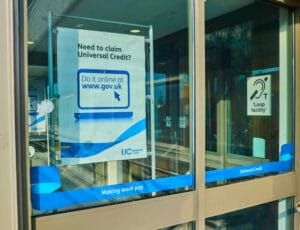In this guide, we outline what defaults are, how they affect your credit, and how to get them removed from your credit file.
If you have received a default notice, it means you have missed loan payments and broken the terms of your credit agreement with your creditor legally obliged to inform you of any missed payments in writing.
If you are unable to cover the missed payments or arrange payment within 14 days, you run the risk of defaulting on your loan which is when the creditor decides you are unlikely to repay your debts and cancels your credit agreement.
It can impact your credit file and make it difficult to get credit or borrow money down the line but by acting responsibly and taking swift action, you can reduce the negative impact that default notices can have on your credit history.
What is your credit report?
Your credit report, or credit file, is a financial record of your credit history that helps lenders assess your creditworthiness when deciding whether to give you credit or approve a loan.
It includes information on how and when you pay your bills, how much debt (if any) you are in, how you have handled your credit accounts in the past, and any other information that has been reported to credit bureaus by your creditors.
It can be accessed from any of the main UK credit reference agencies (Experian, TransUnion, and Equifax) but because creditors don’t always share the same information with each credit reference agency, your credit report can differ slightly depending on where you access it from.

Why choose YourDebtExpert?
- Write off unsecured debts over £5,000
- Stop interest and charges soaring
- Reduced payments from £85 per month
What factors impact your credit rating?
Your credit rating is a score of your likelihood to repay money owed, based on your current income and past credit history.
It can be impacted by various factors including your payment history, amounts owed, credit history length, new credit, and types of credit.
If you have any missing payments or have broken the terms of your credit agreement, for example, a default will be applied, and this can have a negative impact your credit rating.
What is a default notice and does it affect your credit?
If you have received a default notice because of a missed payment, you may be wondering if it affects your credit.
The default notice itself does not affect your credit but if the account defaults, it will be recorded on your credit file for six years (even if you repay in full) and affect your credit rating. This will be updated by each of the main credit reference agencies and reflected in your credit score.
If your credit agreement is regulated by the Consumer Credit Act (1974) and involves payday loans, credit cards, or personal loans, however, your creditor must have legally issued you with a default notice before they can take any further action against you.
If you believe you have been incorrectly served with a default notice, you must contact a credit reference agency and be prepared to provide evidence to support your case, such as bank statements, receipts, or credit card statements.
When can a default notice be removed from your credit file?
If you have been served with a default notice, a default will stay on your credit record for six years even if the debt has been repaid in full within the 14-day period.
There are, however, certain circumstances when a default notice can be removed from your credit file.
There’s been an error on your credit report
If you have already paid the amount claimed in full or a default notice was sent to you in a case of mistaken identity, you may be able to get it removed from your credit report to prevent it from having a negative impact on your credit history.
If the creditor failed to collect the payment in the first place, you were in arrears by less than three months, or a duplicate default was added to your credit file, this is also grounds to request that a default notice is removed from your credit file.
Enough time has passed on your missed payments
If the default has been on your credit file for six years, it will automatically be removed whether you have repaid the money owed in full or not.
If the default was added to your credit file at a later date than it should have been, however, you may also be able to have it removed before the six-year term is over.

How we helped Paige
It was literally the best decision of my life, and it has actually changed my life, cheesy as that sounds, it has changed my life.
Paige , IVA Customer
How to get a default removed from your credit report
There are steps you can take to try and get a default removed from your credit report, but it can be a long and laborious process and the responsibility almost always falls on the consumer.
Contact credit reference agencies and raise a credit report dispute
To get a default removed from your credit report, you must contact credit reference agencies and raise what is known as a credit report dispute.
They will contact the lender on your behalf and request that they check the information they have provided is accurate. In the meantime, a Notice of Correction will be added to your credit report so other lenders know that the information listed may be inaccurate.
If the information is found to be incorrect, your credit report will be updated, and your credit score will increase to reflect this change.
If the lender is confident that the information they have provided is correct but you still disagree, the credit reference agency will let you know what your options are.
Repay the money owed
You may also be able to get a default removed from your credit report by repaying the money owed set out in the original credit agreement.
It won’t reverse the negative impact of having a default on your credit file, but it can prove to creditors that you have repaid the missed payments and are less of a risk.
Consider a debt management plan
Alternatively, you may also be able to get a default removed from your credit report by considering a debt management plan.
This can help you come to an agreement with your creditors to repay debts like payday loans in affordable monthly instalments.
What happens if I can’t afford to repay my defaulted debt?
If you can’t afford to repay your defaulted debt, your debt may be passed on to a debt collector or debt collection agency.
This will result in legal proceedings being taken against you in an attempt to recover the money owed.
If you act quickly and manage to come to an agreement with your creditor within the 14-day period, however, you may be able to prevent further action from being taken against you.
Where can I get advice if I’m worried about my financial situation?
If you are worried about your financial situation, you must seek free advice from a qualified adviser sooner rather than later.
This can help you find a suitable debt solution that you and your creditors are both happy with.
Whether you regularly miss payments, have poor credit history, or are worried about an employer running a credit check on you, free independent advice can help you take the first step towards protecting your financial situation and reducing the negative impact of a default on your credit rating.



